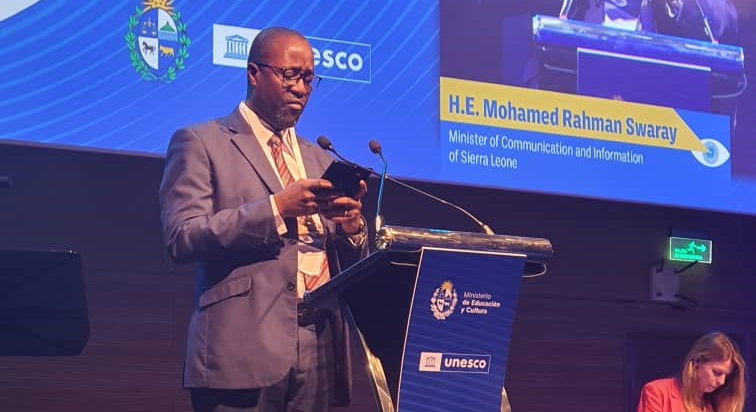Sierra Leone’s Minister of information and Communication, Mohamed Rahman Swaray has on Tuesday 2 May 2022 took part in a high-level interventions and ministerial statements session in commemoration of this year’s World Press Freedom Day, asserting that there is no journalist in prison in Sierra Leone.
The compelling panel discussion as part of the World Press Freedom Day 2022 Global Conference is hosted by UNESCO and the Republic of Uruguay from 2-5 May 2022.
The Minister of Information and Communications, Mohamed Rahman Swaray is the only African Minister invited to the panel discussion.
Check the Swaray’s full speech below 👇🏽
“Good afternoon Distinguished hosts, ladies and gentlemen, let me on behalf of the government and people of Sierra Leone extend thanks and appreciation for the warm welcome extended to me and my delegation since our arrival here three days ago.
Let me start by saying that my presence here today is a testament of our government’s commitment to media freedom and media viability. The government of Sierra Leone is committed to achieving the sustainable development goals and its national medium term development plan – to reduce poverty and underdevelopment. The media provides an important vehicle to deliver on these objectives. However, my government inherited a weak media, fraught with media poverty and a draconian media law that criminalises the journalism profession.
Last year’s UNESCO World Press Freedom Day theme was about the media as a public good. Sierra Leone strongly believes in this. Our first task was to decriminalise the 55-year-old libel law, reviewed the Independent Media Commission Act and joined the global media freedom coalition. We acknowledge as a government that legal reforms alone are not enough which is why my Government is providing annual subventions to the Sierra Leone Association of Journalists (SLAJ).
Because of these bold reform efforts by the government, the media fraternity in Sierra Leone conferred on His Excellency President Julius Maada Bio the title of ‘Champion of Press Freedom’. Despite this conferment, the media in Sierra Leone remain the loudest critique of our President and his Government.
Today, no journalist is in prison, and this year’s annual meeting of the Sierra Leone Association of Journalists (SLAJ) will be the second consecutive year to witness no marches demanding the release of journalists – But this alone is not enough. We will not be doing our job as a government if we do not look at the ecosystem and how we, as a government, can work with the sector, to ensure that media that works in the public interest can survive and thrive. A media that has been significantly diversified and decentralised with over 500 registered media institutions at the last count in 2021.
Expecting the government to provide funding without ensuring that the conditions for the media are optimised is not going to solve the problem. We need to re-engineer the whole sector so that there is a viable economic basis for this: Our national budget is limited, and there are many demands on it. We therefore invite you to join us on this effort. The building blocks for an independent, viable media landscape has to be a collective effort.
We as a government are aware that for the media to work in the interest of the public everyone needs to come together. So we have been involved in a process of national consultation and learning from other international experiences, culminating in the convening of the first national media viability and investment conference in Freetown in the lead up to World Press Freedom Day.
I have the greatest pleasure to unveil the national action plan that resulted from this conference in Sierra Leone at this conference. The action plan is not mine. It is jointly-owned by all media stakeholders in Sierra Leone. But we, as government, pledged that we would stick to our side of it and will continue to play a convening role. In the coming days, I will take the recommendations from the national media viability and investment conference to support public interest media to Cabinet, and next steps for all those involved in this initiative, is to develop a mechanism where these recommendations can be translated into concrete actions, so that we can all work together to achieve the purpose by providing sustainable funding pathways for public interest media in Sierra Leone. We cannot do this alone.
The initiative is already supported by a consortium of media development International Non-Governmental Organisations and is overseen by the working committee on media viability and investment housed by the Independent Media Commission (IMC). We will work to ensure there is coordination and harmony on all investment in improving the media sector work.
Sierra Leone is leading the way with this initiative. It is consistent with the principles of Windhoeck+30 principles announced in last year’s WPFD. We, and our partners in this, are committed to taking the draft national action and developing it into a detailed work plan that we would implement over the coming year. We will undoubtedly hit some obstacles, but we believe that we have a unique opportunity to achieve something that will not only result in a thriving media in Sierra Leone, but perhaps provide a learning experience to other countries.
We will continue to share our experience of this journey and we will be happy to come back here in a year’s time, to report on the progress we have made as a country.
I thank you very much.”



 Post a comment
Post a comment









Comment(s)
Disclaimer: Comments expressed here do not reflect the opinions of Sierraloaded or any employee thereof.
Be the first to comment